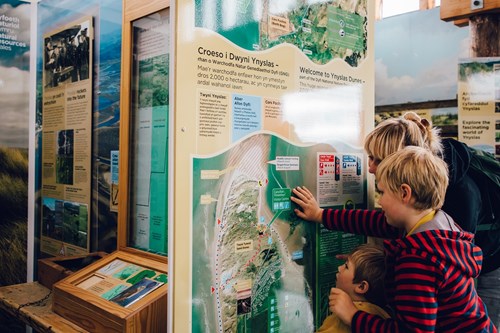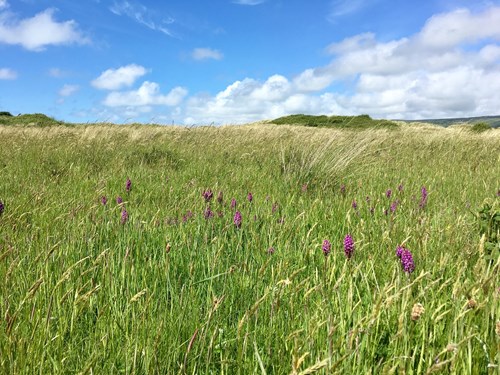The Arch, near Aberystwyth
Walks through huge beech trees with views over...

Update on retail and catering at Natural Resources Wales’ visitor centres
Retail and catering provision at three visitor centres managed by Natural Resources Wales will remain open until March 31, 2025, and will then close.
After closure we will launch a public exercise to look for partners who may be interested in helping to run these services at Bwlch Nant yr Arian, Ynyslas and Coed y Brenin in the future.
All paths, trails, car park, play area and toilet facilities will remain open at the sites and we are holding public meetings to update communities on November 25, 26 and 27.
Please check the Ynyslas Facebook or Instagram page for the latest information.
Ynyslas is part of the Dyfi National Nature Reserve, situated midway between Aberystwyth and Machynlleth.
The superb dunes of Ynyslas are at the southern side of the Dyfi Estuary and are the largest dunes in Ceredigion. The dunes are home to a rich population of orchids, mosses, liverworts, fungi, insects and spiders; many of these species are rare and some are unknown elsewhere in Britain.
The estuary has vast areas of internationally important mudflats, sandbanks and saltmarsh that provide feeding and roosting areas for wetland birds.
There are far-reaching views over the estuary towards Aberdyfi but, even though this town looks so close, it is a 45 minute drive around the estuary from Ynyslas.
Explore the dunes, beach and seashore on the walking trails from the car park or simply follow your nose and take in the wide open spaces, spectacular views and the sounds of wind, sea and birds.
The visitor centre is the ideal place to start your visit.
It has an exhibition about what to see at the reserve, and a shop selling hot and cold drinks, snacks, books and local produce.
The toilets are in the visitor centre building.

The walking trails are waymarked from start to finish.
There are information panels about the walking trails in the visitor centre and in the car park.
Find out about walking trail grades.
Stride through the ever-changing dunes and along the seashore, with stunning displays of flowers in spring and summer and colourful fungi in autumn.
Experience a rich variety of habitat including sand dunes, seashore, farmland and then saltmarsh, with stunning views of the estuary.
Ynyslas is part of the Dyfi National Nature Reserve.
This 2,000 hectare reserve also includes the Dyfi estuary and Cors Fochno.
National Nature Reserves are places with some of the very finest examples of wildlife habitats and geological features.
The landscape and wildlife varies depending on which time of year you visit – here’s what to look out for.

As the weather warms up, there are spring flowers in the dunes and flowering cotton grass on the raised bog.
You may catch a glimpse of one of the many reptiles that live here such as the common lizard, sand lizard, adder and grass snake. The Welsh vernal mining bee is also active during the spring.
There is plenty of birdsong to enjoy, too, from the likes of skylarks, linnets, chiffchaffs and willow warbler. In the evening, nightjars can be heard.
Summer brings a varied display of flowers to the reserve. Marsh and bee orchids appear in the early summer in the dune slacks (the wet areas of the dunes) followed by pyramidal orchids. There are also colourful saltmarsh flowers, sea pink, sea aster, sea spurrey and, in late summer, marsh helleborine.
Butterflies and day-flying moths fill the air, while dragonflies dart around the raised bog.
You might spot wildlife like osprey and otter on the estuary.
The autumn colours are rich and varied on the raised bog which is dressed in a range of russet red colours.
Fungi including waxcaps, earth stars, puffballs and bird’s nest fungi add to the colourful display.
Migrating waders can be seen in the estuary.
During the winter months, the Dyfi estuary is home to wintering wildfowl while, on the beach, you may see waders, sanderling and golden plover.
Keep your eyes peeled for hunting birds of prey over the bog. Look out for:
You might also catch sight of the Greenland white-fronted goose: this is its only locality throughout Wales and England.
There are over 70 National Nature Reserves in Wales.
Find out more about National Nature Reserves.
Ynyslas is the start or end point of the Ceredigion Coast Path.
Much of the Ceredigion Coast Path follows the same route as the Wales Coast Path.
These two paths diverge at Borth and the Ceredigion Coast Path continues to the estuary and sand dunes of Ynyslas.
For more information about the Ceredigion Coast Path go to the Discover Ceredigion website.
Ynyslas Visitor Centre has been accredited as a Quality Assured Visitor Attraction by Visit Wales.
The Visit Wales “Quality Assured” branded logo is awarded to attractions that have been independently assessed against the national standards of the Visitor Attraction Quality Assurance Scheme.
Ynyslas Visitor Centre has been awarded the Green Flag Award.
The award - delivered in Wales by Keep Wales Tidy - is a sign that a park or green space boasts the highest possible environmental standards, is beautifully maintained and has excellent visitor facilities.
For more information about the Green Flag, go to the Keep Wales Tidy website.
Swimming and inflatables are not allowed.
The beach has a red flag for bathing due to the dangerous strong tidal currents.
You can borrow a discovery backpack from the visitor centre.
Each backpack contains useful goodies like binoculars, a magnifying glass, a bug pot and nature identification cards along with a guide explaining how to use them.
We want you to return home safely after your visit here.
You are responsible for your own safety as well as the safety of any children and animals with you during your visit.
Please note:
For advice and tips to help you plan your visit here go to Visiting our places safely.
There is a small car park for Blue Badge holders only beside the main access road to Ynyslas, 30 metres south of the beach car park.
There is access from the Blue Badge holders car park via a hard surfaced track and wooden ramp suitable for wheelchairs to the Ynyslas Visitor Centre.
A 300m section of the Dune Walk from the visitor centre to the main dune slack is accessible. The rest of the trails are not accessible due to soft sand and mud.
The toilets at Ynyslas Visitor Centre are accessible.
Keep dogs under control and do not let them chase birds along the tide line.
Keep all dogs on leads:
Please pick up after your dog and use the dog bins provided.
For a safe and happy visit with your dog, and to avoid causing problems for others, please follow the Dog Walking Code.
Educational groups are welcome, but please contact us by email before visiting.
Please check the top of this page or our Facebook page for any changes to these opening times.
Ynyslas Visitor Centre is open daily from 9.30am to 4pm.
The nature reserve and walking trails are open all year round.
The car park is open all year round but is dependant upon high tide levels - see parking information below.
The toilets are open daily from 9am to 4.30pm.
See the top of this webpage for details of any planned closures or other changes to visitor facilities here.
For your safety, always follow instructions from staff and signs including those for trail diversions or closures.
We may divert or close trails whilst we undertake maintenance work or other operations and we may need to close other visitor facilities temporarily.
In extreme weather, we may close facilities at short notice due to the risk of injury to visitors and staff.
You may need permission from us to organise an event or to carry out some activities on our land.
Check if you are allowed to use our land.
Ynyslas is 10 miles north of Aberystwyth.
The postcode is SY24 5JZ.
Please note that this postcode may not take you to the car park if you use a sat nav or navigation app.
We suggest you follow the directions below or use the Google map on this page which has a pin on the car park’s location.
Take the A487 from Aberystwyth towards Machynlleth.
In Bow Street turn left onto the B4353, signposted to Borth.
After 2½ miles, turn right at the roundabout and follow road parallel to the sea.
Continue for 2 miles and, on the sharp right-hand bend in the village of Ynyslas, bear left to follow the minor road parallel to the sea.
After 1 mile this road comes to an end at the entrance to the Ynyslas Visitor Centre car park.
The car park is on the beach and it is flooded in high tides.
Please note tide times on car park entrance sign.
View this place on the What3Words website.
The Ordnance Survey (OS) grid reference for the car park is SN 610 941 (Explorer Map OL 23).
The nearest mainline railway station is in Borth.
For details of public transport go to the Traveline Cymru website.
The car park is on the beach and it is flooded during very high tides.
Overnight parking is not permitted.
Pay the car park attendant on arrival by cash or card.
If the car park is unstaffed please pay in the visitor centre after parking your vehicle.
Local residents can apply for a free parking pass.
To find out if your address is within the qualifying area, please ring the visitor centre or ask the car park attendant on arrival.
You will need to show proof of address such as a driving licence or recent utilities bill to get your free parking pass.
Please note that the pass for residents is valid for a year from issue and you will need to reapply each year.